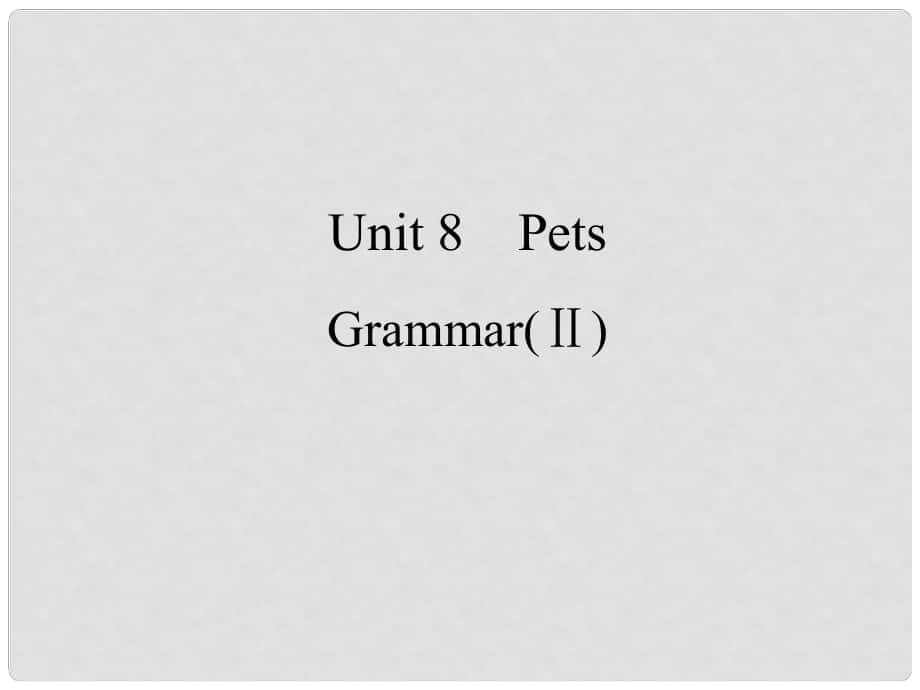《七年級(jí)英語(yǔ)下冊(cè) Unit 8 Pets Grammar課件2 (新版)牛津版》由會(huì)員分享�����,可在線閱讀�,更多相關(guān)《七年級(jí)英語(yǔ)下冊(cè) Unit 8 Pets Grammar課件2 (新版)牛津版(20頁(yè)珍藏版)》請(qǐng)?jiān)谘b配圖網(wǎng)上搜索���。
1、Unit 8 PetsGrammar()復(fù)合不定代詞復(fù)合不定代詞something(某事�,重要的人或事物某事�,重要的人或事物), anything(什么事物,任何事物�,無(wú)論什么事物,任何事物�����,無(wú)論什么事物什么事物), nothing(沒有東西���,什么也沒有�,不沒有東西�,什么也沒有,不重要的人或事重要的人或事)everything(一切事�,最重要的事一切事,最重要的事), someone =somebody(某某 / 有人��,重有人���,重要的人要的人); anyone =anybody(任何人����,無(wú)論誰(shuí)任何人,無(wú)論誰(shuí)); no one=nobody(沒有人�,沒有人,) everyone =everybo
2�、dy (每個(gè)人,所每個(gè)人�,所有人有人);它們還與別有詞構(gòu)成很多習(xí)語(yǔ),如它們還與別有詞構(gòu)成很多習(xí)語(yǔ)�����,如Its nothing. (不用謝��,不必在意不用謝�����,不必在意)�����,anybody else(別人別人)等等�。等等。 STUDYING AIMS1, To know the meanings of indefinite pronouns.2, To use indefinite pronouns correctly.I. someone/somebody, anyone/ anybody and no one/ nobody, everyone/ everybodyThere is someone
3�����、in classroom. (改為否定句)Three isnt anyone in the classroom.=There is no one in the classroom. Where should we use “someone”, “anyone” or “no one?”1. We use someone/somebody in positive sentences to refer to people.2. We use anyone/anybody in negative sentence to refer to people. Its the negative form o
4、f someone/somebody.Summary3. When we use anyone/anybody in positive sentences, it means “any person”.e.g.: Anyone can took part in this competition.4. We use nobody, no one and nothing to refer to “not anyone” and “not anything”.5. We use everybody, everyone and everything to refer to “all people” a
5���、nd “all things”.II. something, anything, nothing , everything1. Millie has something in her hands. (否定句) Millie doesnt have anything in her hands. = Millie has nothing in her hands. 1. Something, anything and nothing are used to refer things. 2. Something is used in positive sentence while anything
6�、is used in negative sentence. Summary3. When we are offering something or when we expect the answer to be “yes” we can use “something” in questions. e.g. Would you like something to eat? (You want the person say “yes”.)1. Is _ here? No, Bob and Tim have asked for leave. (全國(guó)卷全國(guó)卷)A. anybody B. somebod
7���、y C. everybody D. nobodyC2. I will never know what was on his mind at the time, nor will _. (江蘇卷江蘇卷)A. anyone B. anyone elseC. no one D. no one elseBFINISH THE EXERCISES ON PAGE 98.1.Prepare by yourselves.2. Work in groups to read the conversation aloud and understand it.3. Each group reads a senten
8、ce once.4.Ask some questions about the letter and pick out some language points.5.Work in groups to solve your problems.6. Master the useful expressions.堂清知識(shí)我們常用不定代詞代指某個(gè)不特定的人或物�����。1����,不定代詞some-常用于肯定句。疑問(wèn)句中�����,如果 希望得到對(duì)方肯定回答�����,也會(huì)用some-。 2��,不定代詞any-常用于否定句或疑問(wèn)句中�。3,不定代詞no-有否定含義��,nobody=not anyone, nothing=not anything
9��、�����。4�����,不定代詞every-可用于各種句式中��。5�����,不定代詞一般都被視作單數(shù)��。6,形容詞或else常放在不定代詞后�。Exercises1. -What a big box! Can I help you? - No, thanks. Theres _ in it. Its empty.2. - Did the doctor live alone in his home? - He has two sons and a daughter. But lives with him. nothing nobody3. - Theres _ wrong with my clock. It doesnt wo
10、rk. - Dont worry. Let me have a look.4. - _ is in the classroom. Where are they? - They are all on the playground.5. - How easy the Maths exam was����! - Yes. But I dont think _ could pass it. somethingNo one everyone6. - Listen! _ is knocking at the door.7. -What do you think of Kitty? - She is my true friend. She never tells my secrets to _.8. - Helen, what did you talk with Bob? - He asked me to tell him _ I knew. Someone anyonesomethingFinish the exercises in your exercise book .
 七年級(jí)英語(yǔ)下冊(cè) Unit 8 Pets Grammar課件2 (新版)牛津版
七年級(jí)英語(yǔ)下冊(cè) Unit 8 Pets Grammar課件2 (新版)牛津版

